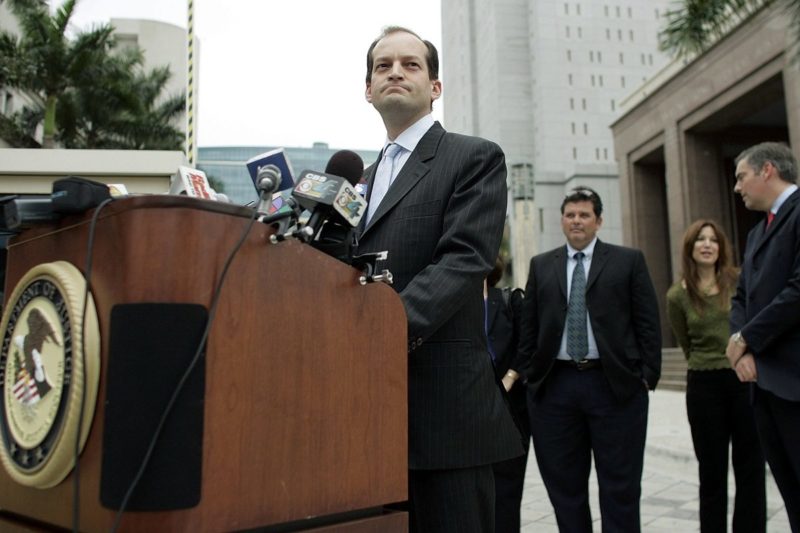Trump’s Labor Department Pick Believes Pay Discrimination Is Real. Does It Matter? (Updated)
Alexander Acosta's comments stand in sharp contrast to the president's statements on wage discrimination and equal pay.

UPDATE, April 28, 10:32 a.m.: The U.S. Senate voted 60 to 38 to confirm Alexander Acosta as labor secretary. Debra Ness, president of the National Partnership for Women & Families, said she was disappointed Acosta breezed through the Senate after “he refused to commit to advancing the mission of the U.S. Department of Labor, putting people over profits, or maintaining independence from the president during his confirmation hearing.”
U.S. Sen. Patty Murray (D-WA) grilled President Trump’s nominee to lead the Labor Department during Wednesday’s confirmation hearing, asking Alexander Acosta whether it’s a problem that men make more than women for the same work.
Acosta testified Wednesday before the Senate Health, Education, Labor and Pensions Committee, of which Murray is the ranking Democrat. Acosta, dean of the law school at Florida International University and former U.S. attorney, is Trump’s second pick for the cabinet post after the failed nomination of fast-food magnate Andy Puzder.
“Women in this country earn about 80 cents on the dollar of what men earn, resulting in a gap of nearly $10,470 each year,” Murray said. “And the gap in pay is far worse for women of color. Do you believe there is a pay gap, and if so, do you believe it hurts women and families?”
Acosta said he’s seen the data, and “to the extent that that pay gap is there, it shouldn’t be.”
“Certainly gender discrimination, which includes pay discrimination, should not occur,” he continued.
Acosta’s comments stand in sharp contrast to the president’s statements on wage discrimination and equal pay.
Although Ivanka Trump said during the presidential campaign that her father would “fight for equal pay for equal work,” the president has described equal pay as “complicated” and compared equal pay legislation to socialism, as PolitiFact has noted.
“I feel strongly—the concept of it, I love,” Trump said of wage equality. “I just don’t want it to be a negative, where everybody ends up making the same pay.”
A 2016 report in the Boston Globe found the Trump presidential campaign paid men, on average, about 35 percent more than women.
Murray asked Acosta whether the Women’s Bureau within the Labor Department would investigate the gender wage gap, and if Acosta is committed to maintaining the budget for the bureau. Trump has proposed to cut the Department of Labor’s budget by almost 21 percent. The Women’s Bureau, formed in 1920, develops policies to improve wages and working conditions for women.
Murray pressed Acosta: “Do you think [the Women’s Bureau] should be a priority? As secretary, will you fight for keeping that?”
“I think it’s important to have an office within the Department of Labor that focuses on women’s issues,” Acosta replied.
“Will that be a priority for you?” Murray asked.
Acosta admitted the department’s priorities rest with the president.
“I’m happy to say it’s a priority … I don’t think any cabinet secretary can make commitments because ultimately we have a boss,” Acosta responded.
“Well, yeah, that’s what worries me,” Murray said.
Murray said the labor secretary must be an independent voice for workers who will push back on the president’s agenda to hurt working families.
During the nearly three-hour hearing, senators pressed Acosta on a controversial plea deal he reportedly cut with a billionaire accused of sexually abusing young girls, and reports of politicized hiring decisions made on Acosta’s watch in the civil rights division of the Department of Justice.
An investigation by the Office of the Inspector General found that Acosta, while assistant attorney general, failed to take “sufficient action” to supervise a former senior official who was “inappropriately” hiring mostly conservative lawyers, as the Washington Post reported.
“It happened on my watch … I deeply regret it,” Acosta said, adding that he would not bow to pressure from the Trump administration in hiring decisions.
Regarding the sexual abuse case involving billionaire Jeffrey Epstein, Acosta told Sen. Tim Kaine (D-VA), who read portions of a Washington Post story about the case during the hearing, that the non-prosecution deal with Epstein was a “broadly held” decision in the office, not his alone.
Acosta wouldn’t state whether he’d back certain labor rules. Sen. Elizabeth Warren (D-MA) pressed Acosta about the Obama administration-era overtime rule, which makes more workers eligible for overtime by lifting the salary threshold for overtime pay from $23,660 to $47,476. Upwards of 4.2 million salaried workers are affected by the 2016 rule, according to the Department of Labor.
Business groups and states had successfully sued to block the rule, and the Obama administration had appealed to allow the rule to go forward. Warren released a report last year indicating that 55 percent of those who stand to gain under the overtime rule are women.
Acosta said that the Trump administration’s executive order requires the Department of Labor to review all rules, including the overtime rule.
